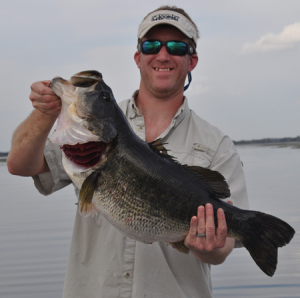Post
Big catches still stroke angler egos
Florida Fishing Articles, Regional Fishing, United States Fishing Articles | Florida theangler PM

By the time barter systems and commerce were developing, being able to take more fish than was needed and then sharing or trading them quickly was advantageous. For many, the adage of “give a man a fish and you feed him for a day; teach a man to fish and you feed them for a lifetime” was a way of survival on the American frontier. So as our society evolved, is it any wonder that recreational fishing evolved to keep us close to nature and the water, and to let us challenge ourselves and our piscatorial skills against the many finned wonders of the world?

Recreational fishes and fishing have become so valuable (an annual $7.5 billion economic impact just in Florida) that promoting catch-and-release and take-only-what-you-need approaches is essential. Habitat conservation efforts and carefully designed regulations that help sustain our fisheries – and especially those that protect and recycle the largest trophy fish – are becoming increasingly important.
As a result, long ago Florida created a “Big Catch” Angler Recognition program that still thrives today and helps stroke the ego and id of each of us, which are pre-programmed by our nature to want to show off our prowess and ability to thrive in nature. The “Big Catch” program provides a framable, full-color certificate and a window sticker for anglers who catch any of 33 species of listed freshwater fishes that exceed a minimum length or weight. To create a further challenge for enthusiasts, if people catch five qualifying fish of the same species, they are recognized as a Specialist. If they report five qualifying fish of different species, they become a Master Angler and if they take and report qualifying fish representing 10 different species, they are an Elite Angler. The program allows youth to participate with fish that are approximately 25 percent smaller than the adult qualifying size. Meanwhile, Big Catch encourages anglers to fish for a variety of species and to travel to locate them, while promoting appropriate catch-and-release.
TrophyCatch will be a full-fledged initiative to document largemouth bass caught, and preferably released, throughout Florida that are heavier than eight pounds. Incremental rewards and recognition will be provided to anglers reporting bass in the 8-10, 10-12, 12-13 and greater than 13-pound categories.The anticipated rollout for TrophyCatch is October 2012.
“This program, driven by private dollars, can substantially enhance Florida bass fishing by addressing ecological issues and encouraging recycling of trophy bass, but it will also have a great social and economic impact,” said Tom Champeau, director of the Division of Freshwater Fisheries Management.
Fisheries biologists will use TrophyCatch reports to identify Florida’s best bass fisheries to determine which management practices (e.g., habitat and aquatic plant management, regulations, stocking) are most effective in creating trophy fisheries. VISIT FLORIDA and FWC will work with the media industry to use this information to establish Florida as a prime trophy bass fishing destination. Incorporating social media and online mapping resources will make this information widely available to the public and create a buzz as anglers report new trophies and post photos. Such recognition will increase both resident and nonresident angler participation and enjoyment; tackle and license sales; tourism; and help create the next generation that cares about our natural resources and outdoor recreational heritage.
Florida is already recognized as the “Fishing Capital of the World,” due to great resources and responsible management (www.FishingCapital.net). Facts from the last several National Surveys of Fishing, Hunting and Wildlife-Associated Recreation, and International Game Fish Association records help substantiate that claim. For instance, in “Sportfishing in America: An Economic Engine and Conservation Powerhouse,” based on the 2006 National Survey, Southwick Associates reported Florida ranked No. 1 in total days fishing (46.3 million), in-state anglers (2.8 million), nonresident anglers (885,000), total angler expenditures ($4.4 billion) and total economic impact ($7.5 billion).
Those numbers depend on both saltwater and freshwater fishing combined. However, in Florida, more recreational fishing days are spent on fresh water (24.4 million days by 1.4 million anglers) than on salt water. Largemouth bass are not only the most sought-after species in Florida but also in the nation. Bass anglers alone generate $1.25 billion for our economy, supporting thousands of jobs.
In March 2010, BassMaster Magazine (McCormick 2010) summarized the first 12 years of its Lunker Club applications, reporting that, ”Considering the number of largemouth entries the Lunker Club has received over more than a decade, it’s not surprising that more entries have been caught in Florida (514 lunkers reported; 27.2%) than any other state.”

Florida has tremendously diverse bass fisheries comprising 3 million acres of water and 12,000 miles of fishable rivers and canals that are open year round. Tim O’Neil, an FWC marketing expert and liaison to the Wildlife Foundation of Florida (a public-support organization affiliated with FWC), pointed out that FWC and the Foundation want to work with the sportfishing industry. “TrophyCatch is in its infancy but will grow quickly, and we want to work with the best and brightest in the corporate world to make this a win-win-win for the environment, anglers and industry,” O’Neil said.
Both programs will be undergoing redesigns and expansions in the next few months. Suggestions from anglers and corporate partners are encouraged. Learn more at MyFWC.com/Fishing (choose Freshwater Fishing than Big Catch) and send suggestions for ways to enhance these partner-driven programs to Bob.Wattendorf@MyFWC.com.

Anglers love to brag and to be recognized for their accomplishments. By satisfying that need and reporting it to others, we hope to not only reaffirm our status as the Fishing Capital of the World, but also become the undisputed Bass Fishing Capital of the World.
Instant licenses are available at MyFWC.com/License or by calling 1-888-FISH-FLORIDA (347-4356). Report violators by calling *FWC or #FWC on your cell, or 1888-404-3922. Visit MyFWC.com/Fishing for more Fish Busters’ columns.
